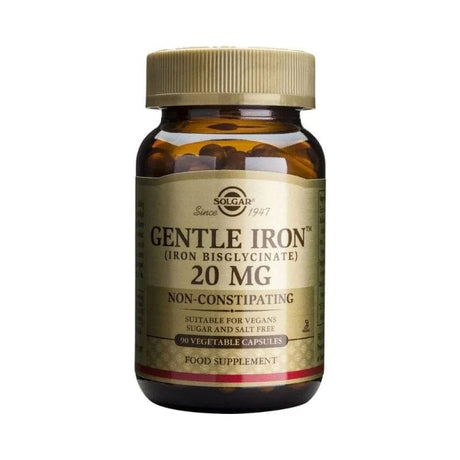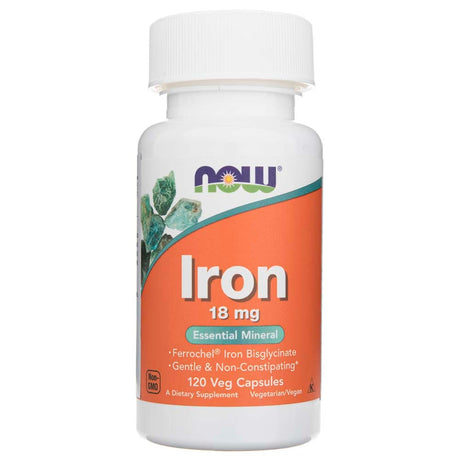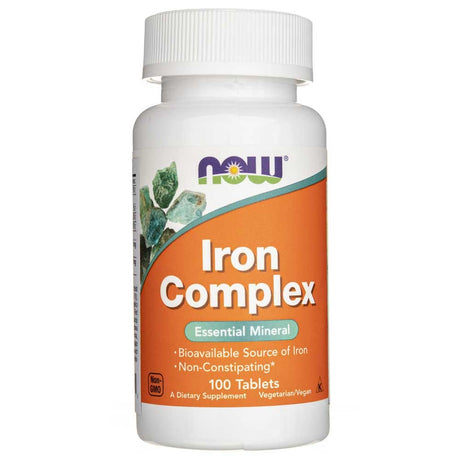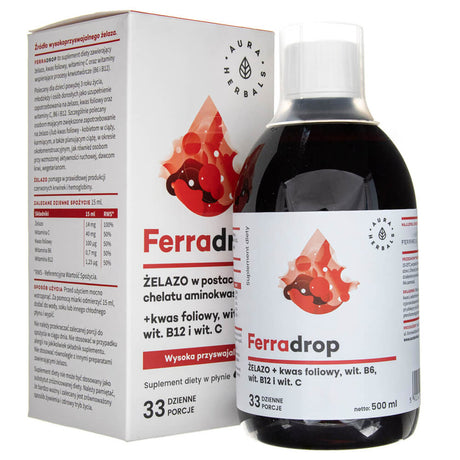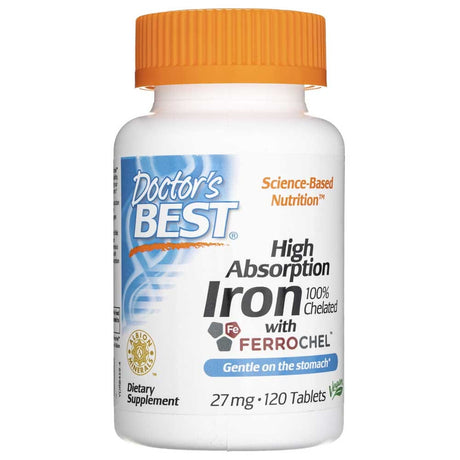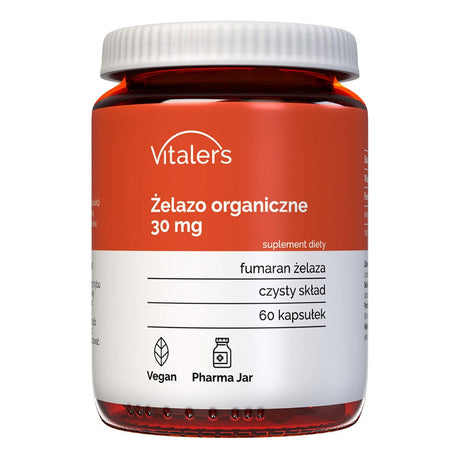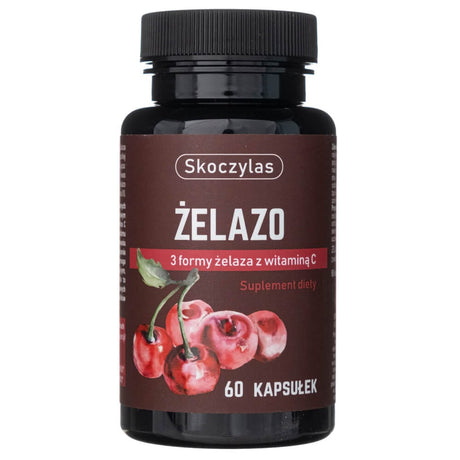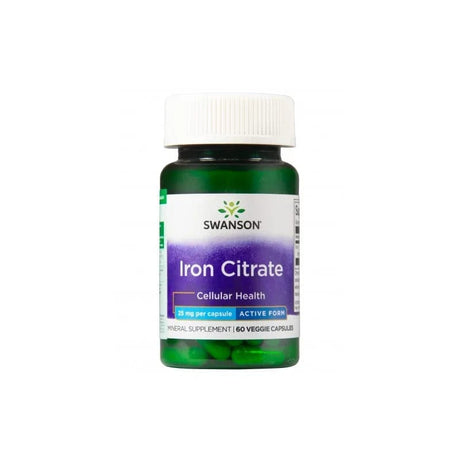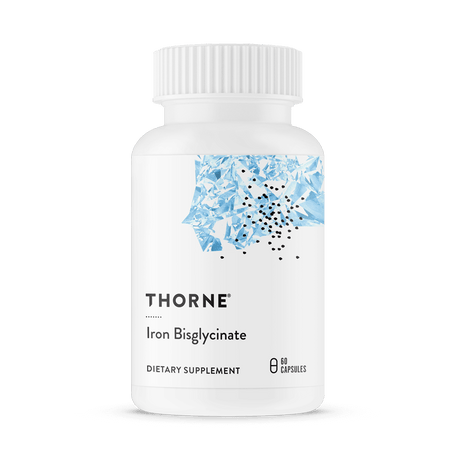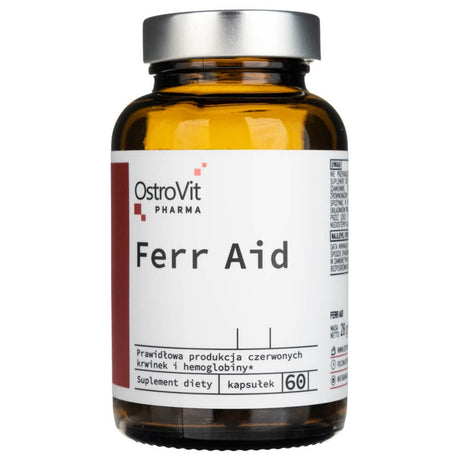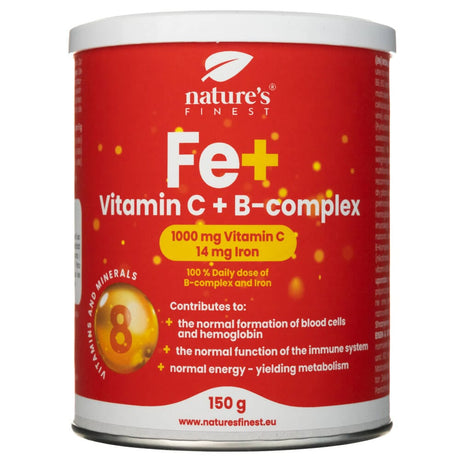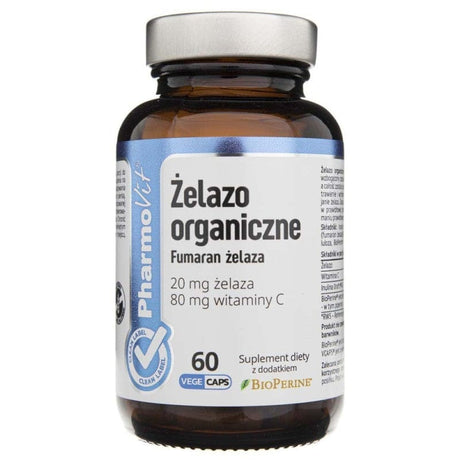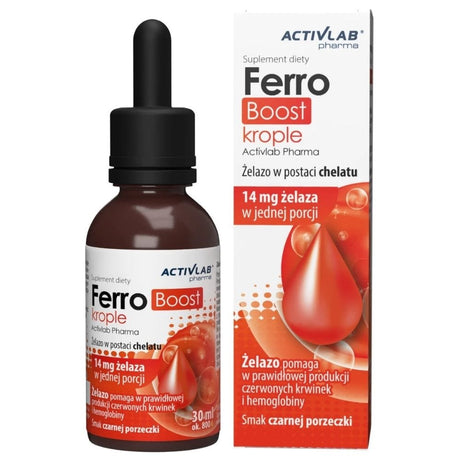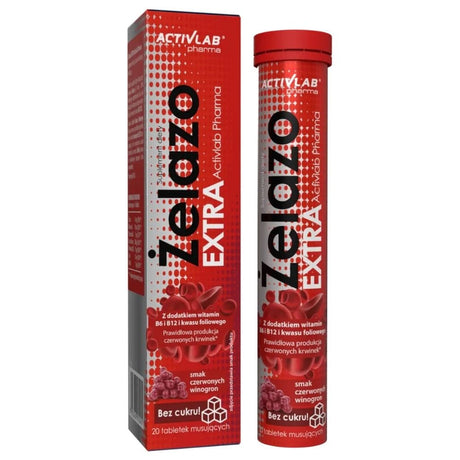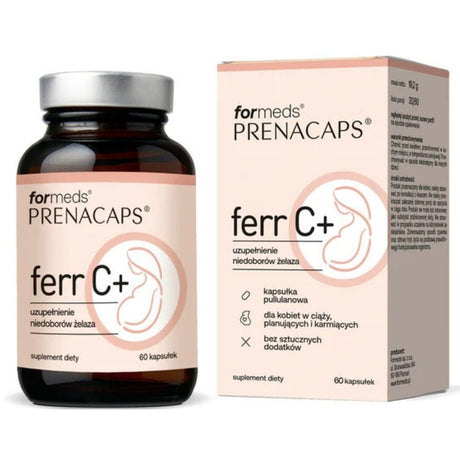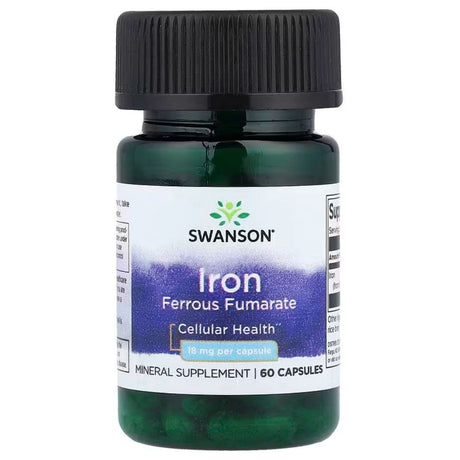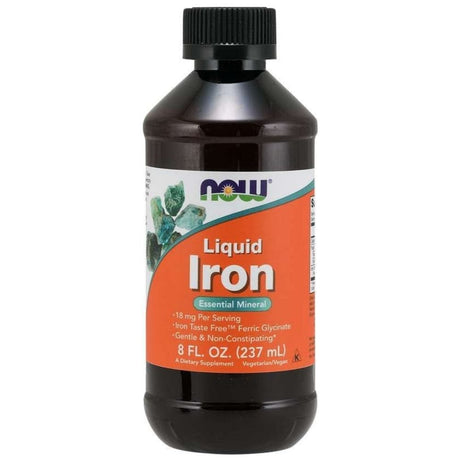Solgar
Solgar Gentle Iron 20 mg - 90 rostlinných kapslí
Běžná cena 382,59 KčJednotková cena4,25 Kč / itemNení k dispoziciAliness
Aliness Železo MicroFerr 25 mg - 100 tablet
Běžná cena 285,59 KčJednotková cena2,86 Kč / itemNení k dispoziciNow Foods
Now Foods Železo 18 mg - 120 veg. kapslí
Běžná cena 254,99 KčJednotková cena2,12 Kč / itemNení k dispoziciNow Foods
Now Foods Iron Complex - 100 tablet
Běžná cena 257,49 KčJednotková cena2,57 Kč / itemNení k dispoziciAura Herbals
Aura Herbals Ferradrop - tekuté železo + kyselina listová - 500 ml
Běžná cena 201,49 KčJednotková cena402,98 Kč / lNení k dispoziciDoctor's Best
Doctor's Best Vysoce vstřebatelné železo s ferrochelem 27 mg - 120 tablet
Běžná cena 356,99 KčJednotková cena2,97 Kč / itemNení k dispoziciVitaler's
Vitaler's Organické železo 30 mg - 60 kapslí
Běžná cena 147,79 KčJednotková cena2,46 Kč / itemNení k dispoziciPurelab Marek Skoczylas
Skoczylas Železo 3 formy s vitaminem C - 60 kapslí
Běžná cena 186,09 KčJednotková cena3,10 Kč / itemNení k dispoziciSwanson
Swanson Citrát železa 25 mg - 60 kapslí
Běžná cena 119,69 KčJednotková cena1,99 Kč / itemNení k dispoziciThorne Research
Thorne Research Bisglycinát železa 25 mg - 60 kapslí
Běžná cena 459,29 KčJednotková cena7,65 Kč / itemNení k dispoziciChildLife
ChildLife Tekuté železo, s příchutí přírodního ovoce - 118 ml
Běžná cena 435,69 KčJednotková cena3.692,29 Kč / lNení k dispoziciNow Foods
Now Foods Komplex železa 27 mg - 100 kapslí
Běžná cena 311,29 KčJednotková cena3,11 Kč / itemNení k dispoziciOstrovit
Ostrovit Pharma Ferr Aid - 60 kapslí
Prodejní cena 190,50 Kč Běžná cena 211,69 KčJednotková cena3,18 Kč / itemNení k dispoziciDr. Jacob's
Dr. Jacob's Lipozomální železo, v prášku - 64 g
Běžná cena 459,29 KčJednotková cena717,64 Kč / 100gNení k dispoziciSwanson
Swanson Albion Ferrochel Iron 18 mg - 180 kapslí
Běžná cena 216,69 KčJednotková cena1,20 Kč / itemNení k dispoziciSalvum
Protego Feminovit Iron - 30 tablet
Běžná cena 99,29 KčJednotková cena3,31 Kč / itemNení k dispoziciNature's Finest
Nature's Finest FE+ Vitamin C + B komplex - 150 g
Běžná cena 186,09 KčJednotková cena124,06 Kč / 100gNení k dispoziciPharmovit
Pharmovit Organické železo (Fumarát železa) - 60 kapslí
Prodejní cena 162,78 Kč Běžná cena 180,89 KčJednotková cena2,71 Kč / itemNení k dispoziciActivlab
Activlab Pharma FerroBoost Železo v kapkách, Černý rybíz - 30 ml
Běžná cena 181,39 KčJednotková cena604,63 Kč / 100mlNení k dispoziciActivlab
Activlab Pharma Iron Extra + Vitamins, Hroznové víno - 20 šumivých tablet
Běžná cena 60,99 KčJednotková cena3,05 Kč / itemNení k dispoziciFormeds
Formeds Prenacaps Ferr C+ - 60 kapslí
Běžná cena 752,79 KčJednotková cena12,55 Kč / itemNení k dispoziciSolgar
Solgar Gentle Iron 25 mg US - 180 rostlinných kapslí
Běžná cena 535,89 KčJednotková cena2,98 Kč / itemNení k dispoziciSwanson
Swanson Fumarát železa 18 mg - 60 kapslí
Běžná cena 114,69 KčJednotková cena1,91 Kč / itemNení k dispoziciNow Foods
Now Foods Železo tekuté - 237 ml
Běžná cena 408,29 KčJednotková cena1.722,74 Kč / lNení k dispozici
Poznejte životně důležitou roli železa ve vašem těle
Železo je nezbytný minerál, který hraje klíčovou roli v mnoha tělesných funkcích. Navzdory jeho významu, zůstává nedostatek železa jedním z nejčastějších nedostatků živin na celém světě. Tento článek se zabývá významem železa v těle, příčinami a příznaky nedostatku železa, a tím, jak zajistit dostatečný přísun tohoto životně důležitého prvku.
Základní význam železa
Lidské tělo obsahuje přibližně 4 gramy železa, což představuje 0,005% tělesné hmotnosti. Železo je sice přítomno v každé buňce, ale nejvíce se koncentruje v hemoglobinu a myoglobinu, které jsou pro lidský metabolismus klíčové. Hemoglobin přenáší kyslík z plic do tělesných tkání, zatímco myoglobin zásobuje kyslíkem svaly. Železo také podporuje funkci imunitního systému a celkovou výkonnost organismu, a hraje důležitou roli při fyzické i duševní výkonnosti.
Vstřebávání železa a ovlivňující faktory
Vstřebávání železa probíhá především ve dvanáctníku, odkud je krví transportováno do tělesných buněk. Železo, má však poměrně nízkou biologickou dostupnost, kterou může dále ovlivňovat několik faktorů:
- Zdroj železa: Hémové železo z živočišných produktů se vstřebává lépe než nehemové železo z rostlinných potravin.
- Složky stravy: Některé látky, jako jsou fytáty a vápník, mohou bránit vstřebávání železa.
- Zdraví trávicího traktu: Stavy, jako je zánětlivé onemocnění střev, mohou snižovat vstřebávání železa.
- Léky a doplňky stravy: Některé z nich mohou narušovat vstřebávání železa.
- Přípravky zvyšující vstřebávání: Vitamin C a další látky mohou zlepšit vstřebávání železa.
Rozpoznání nedostatku železa: Stupně a příznaky
Nedostatek železa se obvykle vyvíjí postupně, a prochází třemi stádii:
- Vyčerpání zásob železa
- Snížený přísun železa do erytrocytů, zatímco hemoglobin v krvi zůstává normální
- Nástup anémie, když se deficit železa stává výrazným
Mezi běžné příznaky nedostatku železa patří:
:
- Přetrvávající únava
- Dušnost (dyspnoe)
- Závratě a bolesti hlavy
- Bledá kůže
- Snížené kognitivní funkce
Doplňky stravy s obsahem železa:
Doplňky železa jsou vynikajícím způsobem, jak řešit nedostatek železa ve stravě. Dostatečná hladina železa je klíčová pro řadu tělesných funkcí, včetně přenosu kyslíku, jeho ukládání, a využití, a také přenosu elektronů. Doplňky železa mohou podpořit funkci imunitního systému, zvýšit tělesnou výkonnost, a zlepšit fyzickou i duševní výkonnost.
Vliv železa na energii a zdraví srdce
Nedostatek železa může významně ovlivnit účinnost využití energie v těle. Může vést k arytmiím, snížené funkci srdce, a dokonce ke zvětšení srdce. Někteří vědci také naznačují možnou souvislost mezi nedostatkem železa a fibromyalgií, což je onemocnění charakterizované chronickými bolestmi svalů a kloubů.
Železo během těhotenství: Během těhotenství, se potřeba železa zdvojnásobuje v důsledku zvýšeného objemu krve a požadavků vyvíjejícího se plodu. Železo je nezbytné pro tvorbu hemoglobinu, který přenáší kyslík do orgánů a tkání dítěte. Nedostatek železa během těhotenství může vést k závažným komplikacím, včetně předčasného porodu, nízké porodní hmotnosti, a poporodní deprese. Železo pro děti: Zatímco se děti rodí se zásobami železa, pro udržení správné hladiny pro růst a vývoj je zásadní jeho průběžný příjem. Nedostatek železa v dětství může mít za následek zhoršení kognitivních schopností, ADHD, a další vývojové problémy, což podtrhuje důležitost dostatečného příjmu železa v těchto formativních letech. Zdroje železa ve stravě
Zdroje železa ve stravě
Železo se v potravinách vyskytuje ve dvou formách:
- Hemové železo:
- Nehemové železo: nachází se v živočišných produktech, jako je červené maso, ústřice, a ryby, a tělo ho snadno vstřebává.
- Nehemové železo: Je obsaženo v obohacených potravinách a rostlinných zdrojích, jako jsou fazole, špenát, čočka, ořechy, a sušené ovoce. Tato forma má nižší biologickou dostupnost a vyžaduje větší úsilí pro vstřebání.
Pro zajištění dostatečného příjmu železa, se doporučuje zařadit do stravy oba typy železa.
Sledování hladiny železa
Pravidelné krevní testy jsou nejúčinnějším způsobem, jak odhalit nedostatek železa dříve, než se rozvine anémie. Referenční hodnoty koncentrace železa v séru se liší podle věku a pohlaví. Zdravotníci doporučují každoroční testování, nejlépe jako součást komplexní zdravotní prohlídky, aby se nedostatek železa odhalil a řešil včas.
